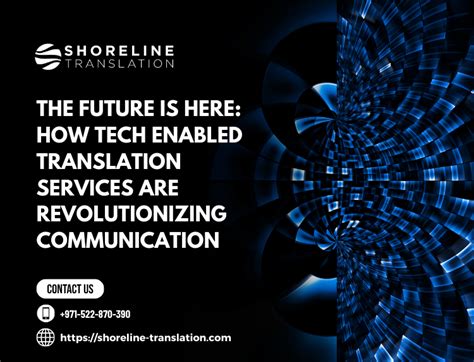In today's interconnected world, language barriers have become a significant obstacle to global communication and understanding. With the rise of international trade, tourism, and online interactions, the need for effective communication across languages has never been more pressing. Fortunately, technology has come to the rescue, revolutionizing the way we translate languages and enabling seamless communication across the globe.
The Evolution of Translation Services

Machine Translation: The Game-Changer
Machine translation (MT) has been a significant breakthrough in the translation industry. MT uses algorithms and artificial intelligence (AI) to translate languages, enabling rapid and accurate translations. This technology has improved dramatically over the years, with the development of neural machine translation (NMT) and deep learning techniques. NMT has significantly enhanced the accuracy and fluency of translations, making it possible to translate complex texts and conversations with remarkable precision.Benefits of Tech-Enabled Translation Services

- Increased efficiency: Tech-enabled translation services can translate large volumes of text and conversations rapidly, reducing the time and effort required for human translation.
- Improved accuracy: MT and NMT have significantly improved the accuracy of translations, reducing errors and ensuring that translations are precise and reliable.
- Cost-effectiveness: Tech-enabled translation services are often more cost-effective than human translation, especially for large-scale translation projects.
- Scalability: Tech-enabled translation services can handle large volumes of translation requests, making them ideal for businesses and organizations with high translation needs.
- Accessibility: Tech-enabled translation services can be accessed remotely, making them available to anyone with an internet connection.
Real-World Applications of Tech-Enabled Translation Services
Tech-enabled translation services have numerous real-world applications, including:- Business: Tech-enabled translation services can help businesses communicate with international clients, partners, and customers, facilitating global trade and commerce.
- Tourism: Tech-enabled translation services can help tourists navigate foreign languages, making it easier to travel and explore new destinations.
- Education: Tech-enabled translation services can help students and teachers communicate across languages, facilitating global learning and collaboration.
- Healthcare: Tech-enabled translation services can help healthcare professionals communicate with patients who speak different languages, improving healthcare outcomes and patient care.
Challenges and Limitations of Tech-Enabled Translation Services

- Language complexities: Tech-enabled translation services can struggle with language complexities, such as idioms, colloquialisms, and cultural nuances.
- Domain expertise: Tech-enabled translation services may require domain expertise to ensure accurate translations, especially in specialized fields like law, medicine, and finance.
- Contextual understanding: Tech-enabled translation services can struggle with contextual understanding, which can lead to errors and inaccuracies.
Future Developments in Tech-Enabled Translation Services
The future of tech-enabled translation services looks promising, with several developments on the horizon:- Artificial intelligence: AI will continue to play a significant role in tech-enabled translation services, enabling more accurate and efficient translations.
- Neural machine translation: NMT will continue to improve, enabling more accurate and fluent translations.
- Computer-assisted translation: Computer-assisted translation tools will become more prevalent, enabling human translators to work more efficiently and effectively.
Conclusion: Revolutionizing Language Barriers
Tech-enabled translation services have revolutionized the way we communicate across languages, enabling faster, more accurate, and cost-effective solutions. While there are still challenges and limitations to consider, the benefits of tech-enabled translation services are numerous, and the future looks promising. As technology continues to evolve, we can expect to see even more innovative solutions to language barriers, enabling seamless communication across the globe.





What is machine translation?
+Machine translation is a type of translation that uses algorithms and artificial intelligence to translate languages.
What is neural machine translation?
+Neural machine translation is a type of machine translation that uses deep learning techniques to enable more accurate and fluent translations.
What are the benefits of tech-enabled translation services?
+Tech-enabled translation services offer several benefits, including increased efficiency, improved accuracy, cost-effectiveness, scalability, and accessibility.
